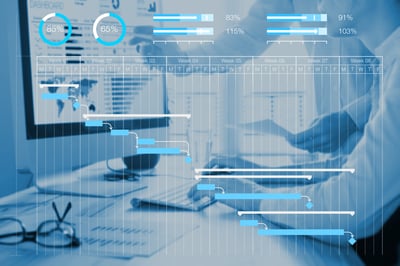
 Implementing a transportation management software (TMS) system remotely can be challenging, no matter the business environment.
Implementing a transportation management software (TMS) system remotely can be challenging, no matter the business environment.
While allowing employees to work remotely part of the time isn't new, having the majority or all project team members working from home on a full-time basis is new and can bring challenges. As a project leader, you’ll want to make changes to your standard implementation procedures to account for this new reality.
To help make this easier, we’ve come up with the top seven project management essentials to help your team be successful in its TMS implementation.
Top 7 Remote Project Management TMS Implementation Essentials
Planning
Common Working Hours
Communication
Effective Project Management Software
Adapted Remote Training
Testing, Testing, Testing
Flexibility
Planning
Planning has always been important for a successful TMS implementation, but it's even more important when the daily interactions between team members are reduced because they are working remotely.
A detailed plan that is clear on objects and dependencies is even more important to avoid duplication of effort or misses in project due dates.
Microsoft Project or any number of other project management platforms are critical to help identify issues and hold staff and implementation partners accountable to their tasks.
Common Core Work Hours
 With remote teams and close to zero travel the implementation teams and business employees involved in the TMS project are working across various time zones. To improve communication and to have the critical communication paths real-time, it is critical to have the teams working within the same set of core hours.
With remote teams and close to zero travel the implementation teams and business employees involved in the TMS project are working across various time zones. To improve communication and to have the critical communication paths real-time, it is critical to have the teams working within the same set of core hours.
This is not to say everyone needs to be working over the same eight hours everyday, but to be working a core set of hours (four to six hours) everyday. The challenge we have seen most is finding those core hours where employees can be on 100% of the time, while they are having to support their children’s schooling being 100% remote or under some hybrid learning model their school district is operating under during COVID-19.
Communication
Formal Communication
You should set up formal communication channels to keep team members apprised of important project details, such as, overall status, contingencies, where shortfalls are occurring, etc.
We have found employees are less likely to communicate with each other than they would in an office environment, and therefore a structured communication channel needs to be established.
Informal Communication
Some of the best conversations occur at a moments notice and as we have all discovered remote work has all but eliminated the informal conversations had in an office environment.
With that said, there needs to be a mechanism put in by the TMS implementation team to draw out these informal conversations. Some organizations have gone to using Slack or similar types of online team chat software.
While the team chat software helps, we recommend having as many conversations on video platforms for all calls to help drive some of the informal opportunities that can otherwise be missed because of working remotely.

Effective Project Management Software
While email has become the tool of choice for outside of the office communication, it is one of the weakest forms of communication for working projects.
People’s email boxes are full of “regular” business and there needs to be a project management mechanism outside of email to communicate project progress and throw out questions, concerns and change orders that can be tracked, assigned and closed in a formal matter. There are a number of software packages that manage this process well.
For this reason, we recommend setting up a project management or ticket type piece of software to handle this work. This tool will also allow the company to see and track real-time hours the IT TMS implementation team is putting on billable hour tasks, so they do not come in as a surprise at given points in the project phases.
While this is a bit off topic, we do recommend companies ask their integration partner to not work billable hour tasks until the quote is approved. Once the team begins the work we would also recommend billable hours are sent on the 15th and end of the month, so to avoid any surprises.
So, when looking for a project management software package find one that handles all the above work and if working with an implementation partner inquire how they handle this communication.
Adapted Remote Training
 When planning your TMS rollout, consider how you will train employees remotely. Keep in mind when looking at this phase of the TMS implementation that not all employees have the same computer skill level or home office set-ups that are conducive to training.
When planning your TMS rollout, consider how you will train employees remotely. Keep in mind when looking at this phase of the TMS implementation that not all employees have the same computer skill level or home office set-ups that are conducive to training.
We would recommend having both asynchronous and synchronous training sessions, in addition to having written documentation for key functionality.
The reason for the three recommendations is people have different learning styles.
In addition to adapting your training to a remote workforce, it is also important to ensure training is timely, effective and verifiable that the skillsets are being learned to be an effective worker on the new TMS being installed. Missing any of these points will make for a tremendously rough go-live phase of the project.
Testing, Testing & Testing
 Similar to buying property where the 3 most important things a buyer needs to pay attention to are the same in Location-Location-Location, implementing a TMS has the same requirement but with the three items being Testing-Testing-Testing.
Similar to buying property where the 3 most important things a buyer needs to pay attention to are the same in Location-Location-Location, implementing a TMS has the same requirement but with the three items being Testing-Testing-Testing.
To ensure the TMS system meets your company's business requirements before go-live, you will have multiple types of testing procedures. All of the testing types are important and serve a specific function in their purpose.
End-to-End Tests
End to end testing (E2E testing) refers to a software testing method that involves testing an application’s workflow from beginning to end. This test aims to replicate real user scenarios, so that the system can be validated for integration and data integrity.
User Acceptance Tests
User Acceptance Testing (UAT) is the final stage of any software development life cycle. This is when actual users test the software to see if it is able to carry out the required tasks it was designed to address in real-world situations. UAT tests adherence to your business requirements. UAT testers aim to validate processes against original requirements.
Stress Tests
Stress testing is a type of testing that validates the stability and reliability of the system under extremely heavy load conditions. This test is done to make sure the system will not crash under your busy times in a given day or in given seasonal business patterns.
Flexibility
![]() Last, but not least is flexibility and effective communication to corporate leadership.
Last, but not least is flexibility and effective communication to corporate leadership.
Any project the magnitude of a transportation management software system brings challenges, even when it is well planned. Add in the 100% remote workforce and the challenges can be magnified.
The key is to exercise patience, a clear mind and then being able to react to the situation. As part of this, don’t put your head down and just stick to the plan if there is questions while moving through the various stages of the TMS implementation. If that voice in your head is telling you to pull up and make adjustments, then do so.
Nothing worse than trying to force a square peg in a round hole and create a disaster that everyone has to live through. So, be methodical and thoughtful through the project and communicate challenges to the leadership and all will be ok.
Next Steps
Now that we have gone through the keys to a successful TMS implementation with a remote work team, we recommend vetting out other resources to help you along the way.
A strong implementation partner can be found by asking your TMS vendor for recommendations. If you are interested in the MercuryGate TMS, we would love to be a part of the conversation.
InTek is a Certified Reseller of the MercuryGate Cloud TMS, which is consistently ranked as a top 5 TMS in the market by Gartner in their Magic Quadrant Analysis.
Other TMS System Articles that May Be of Interest:
- A Complete Guide to TMS Freight Software: Market Capabilities and Solutions for Shippers
- Should Your Company Purchase & Implement a TMS System During COVID-19?
- MercuryGate Certified Integrator Channel Partner: Benefits & Value
- Top 6 Cloud TMS Implementation Challenges During COVID-19
- Best Transportation Management System (TMS) Software Packages
- Top 10 Transportation Management Software (TMS) Implementation Pitfalls to Avoid
- TMS RFP Template
- Gartner’s Magic Quadrant Analysis Key to TMS Buying Selection Process
If you're ready to take the next step, at InTek Freight & Logistics, we can help. Just tell us what you need and we'll discuss how our expertise can help with the unique shipping challenges your business faces. Rather do a bit more research first? View our Freight Guides for comprehensive articles and eBooks on all things freight and logistics.
Get Updates
Featured Articles
Categories
- Freight & Shipping Costs (54)
- Freight Broker (60)
- Freight Forwarder (2)
- Intermodal Transportation (184)
- International & Cross Border Logistics (43)
- Logistics & Supply Chain (420)
- Logistics Service Provider (77)
- LTL (39)
- Managed TMS (49)
- News (39)
- Supply Chain Sustainability (12)
- Transportation Management System (37)
- Truckload (122)
- Warehousing & Distribution (50)




